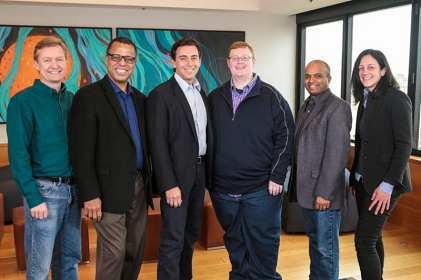
Ford Motor Company announced Friday a $1billion investment over the next five years in a startup called Argo AI (Pittsburgh), founded by two top AI robotic talents Bryan Salesky and Peter Rander.
Salesky and Randar are alumni of the Carnegie Mellon National Robotics Engineering Center and former leaders on the self-driving car teams of Google and Uber.
Ford will be the majority stakeholder in Argo AI. Although Argo AI will become technically Ford’s subsidiary, the automaker said Argo AI has been structured to operate with substantial independence.
Ford President and CEO Mark Fields said during the press briefing, “There is a war for talent going on out there.” He explained that Argo employees will have significant equity in the company, which he believes will make it easier to hire top talent.
“Our short term goal for Argo AI is to bring SAE’s Level 4 autonomous cars to the market by 2021,” said Fields. Down the road, Ford is considering licensing the technology to others, he added.
Argo AI, founded in November, 2016, lists Salesky as its CEO and Rander as COO. The company declined to disclose how many people are already working at the startup.
Mike Demler, senior analyst at the Linley Group, said, "At this point, Argo is nothing but a few smart guys from Google and Uber." But with their plan to hire 200 people by the end of the year, they will integrate the Ford autonomous-vehicle team into a wholly-owned subsidiary, he explained.
When Raj Nair, Ford’s executive vice president for Global Product Development, and chief technical officer, was asked about the specific Argo AI technologies that attracted Ford, he said, “When the industry’s two top talents – two pioneers in the field – are suddenly becoming available, you don’t pass up an opportunity like that.”
The companies declined to draw any detailed comparisons between Argo AI and other automotive AI tech companies such as Google.
Unique hybrid model
Instead, they stressed that the partnership represents a “unique hybrid business model,” under which Ford can take advantage of the speed and agility of the startup, while Argo AI can leverage Ford’s strategy and resources.
More specifically, as Salesky explained, “Argo AI makes a brain of the virtual driver system, while Ford develops nerve systems, skeleton and muscle” within autonomous cars. The tech startup sees the partnership with Ford as invaluable. Salesky stressed that the autonomous car “is a system’s problem. Software and hardware need to be integrated. We need a full vehicle development team behind it.”
Ford CTO Nair added that with the hybrid model, “We bring solid funding, and customers, while we also offer the ability to integrate Argo’s AI system.” The autonomous vehicle platform will be owned by Ford.
The Linley Group's Demler said, according to the Ford CEO, "Ford will develop the hardware that runs Argo AI’s software." When Demler asked Fields about the specifics of the hardware, "I got a nod from the Argo founder, but no direct answers," he said. But the Argo AI-Ford team "will need to make the software hardware agnostic if they expect to license it," Demler stressed. "The could be a challenge."
Some Ford engineers currently working on the Virtual Driver System are expected to move to Argo AI. The companies, however, declined to specify numbers. Argo AI also declined to discuss specific IPs and patents the startup will bring to Ford.
Asked about how many hours of testing will be needed to make the Argo AI-based Virtual Driver System safe, Salesky said, “Testing is done in so many different prongs. The mileage required for testing is only one of the hundreds of different prongs.”
Now that it’s becoming a part of Ford, Salesky said that in order to ensure the safety of autonomous cars, “we need to collaborate with other [OEMs] and regulators like NHTSA, and work with certification process in a responsible way.”

Tech - Auto partnerships
Despite all the talk about partnerships between tech companies and automakers to jointly develop autonomous cars, remarkably, very little has happened thus far.
Just before the Consumer Electronics Show in 2016 – more than a year ago, Google and Ford were rumored as potential partners in the self-driving auto race. That announcement never happened, and Ford went without an external AI partner until now.
----Form EE Times